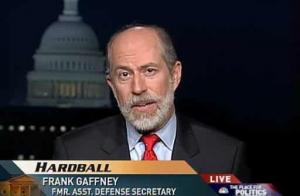The Univited: Gaffney on Obama Adminstration’s “Wrecking Operation of the U.S. Military”
By Michael Patrick Leahy – Breitbart
On Saturday, Frank Gaffney, the Founder and President of the Center for Security Policy, told Breitbart’s Uninvited panel at CPAC that the Obama administration’s policy of unilateral de-nuclearization has “profoundly hurt our nation’s national security.”
Very few people are paying much attention to this,” Gaffney said. Yet “this is the single most essential national security decision in our lifetime that no one knows is being made.”
In an exclusive interview, Gaffney told Breitbart News on Friday, “I was very gratified that your team at Brietbart gave us an opportunity to do talk about this important issue. The point was it wasn’t on the agenda at CPAC.”
Unilaterally reducing our nuclear arsenal is not the only national security weakness of the current administration, according to Gaffney. “The Obama administration is engaged in a wrecking operation to create conditions under which the American military is riven with problems even worse than during the Carter administration hollowing out,” he said.
Gaffney described two simultaneous developments. Just as the world is becoming more dangerous, the Obama administration is in the process of breaking “the only military we have. It’s hard to say [they’ve completely] broken it yet, but it’s a creeping problem. This mortar episode in Nevada is probably a symptom. It’s the kind of thing you will see lots and lots of in the future,” he predicted.
The reason there has been so little opposition to the Obama administration’s gutting of our national security and defense capabilities, Gaffney believes, is that the American people are largely unaware of it. “I simply do not believe the American people, if they were aware of what is happening, would support it,” he said. “It does demand attention. We’re not going to get any corrective action on the Hill without more public debate about this. The most consequential decision of our time is not getting the kind of attention it deserves.”
 Dangerous recent developments are an example of “the world of hurt” we find ourselves in, Gaffney said. “We’ve had in the space of the past couple of weeks a government with some capability to execute the threat, North Korea, threaten a nuclear attack on the United States and even that hasn’t captured much attention.”
Dangerous recent developments are an example of “the world of hurt” we find ourselves in, Gaffney said. “We’ve had in the space of the past couple of weeks a government with some capability to execute the threat, North Korea, threaten a nuclear attack on the United States and even that hasn’t captured much attention.”
On a broader theme, Gaffney tied our national security weakness to the rise of Islamism. “The meta issue of the day is the rising tide of Islamism and its implications for our friends in places like Israel and for us its really worrying and being exacerbated by the Obama administration’s embrace of these guys. This is the contemporary manifestation of Reagan’s statement about every generation facing an existential threat to freedom.”
“It’s not exclusively reducing the stock–meaning the numbers of weapons in our arsenal–that’s a problem. It’s also the Presidents adoption–with essentially no debate–as a matter of state policy of this idea we’re going to rid the world of nuclear weapons. Before he came to office, it was pretty much dismissed as a lunatic idea.” That was the case, said Gaffney, until President Obama “unilaterally declared that’s our policy.”
In addition, Gaffney noted that the Obama administration has not been a good steward of the nuclear arsenal it inherited. “It’s the condition of what’s left [in our nuclear arsenal] and our ability to support what’s left that’s worrying,” he added.
“We’ve essentially been living off Ronald Reagan’s legacy, but there’s been very little done to enhance our nuclear capabilities ever since his administration. One of the very important issues is should we be modernizing our nuclear forces to make them safer, more reliable, and more effective than they are today,” Gaffney stated. “We’re confronting a world that’s very different than the world of Ronald Reagan but essentially are living off the nuclear forces his administration developed. None of these weapons have been tested in over 20 years. Many of them are decades beyond their design life. The platforms to deliver them are aging.”
The infrastructure to support our nuclear arsenal has diminished dramatically, in Gaffney’s view. “The underlying industrial base and technology base isn’t nearly what it used to be. You could count on one hand the number of people who have experience in designing and testing our nuclear weapons. This translates into uncertainty about the reliability of our nuclear weapons.”
According to Gaffney, who served as Deputy Assistant Secretary of Defense in the Reagan administration, the situation has deteriorated with every successive president. “This did not start with the Obama administration. It was true of George W. Bush, Bill Clinton, and goes back to George H.W. Bush. But it’s gotten dramatically worse under Obama.”
Along with the decline in presidential attention to these critical national security issues, Gaffney criticized prominent former Defense and State Department officials, as well as one prominent former senator. “You do now have this well-funded aggressive agitation organization, and they’ve enlisted what I call the Four Horsemen–Former Secretary of Defense Bill Perry, Former Secretaries of State Henry Kissinger and George Schultz, and former Senator Sam Nunn–all of whom should know better, and they’re touting this comprehensive test ban treaty. Most of these guys are part of the Global Zero initiative, a Ted Turner, George Soros, Warren Buffet-funded operation.”
This world view rests on three premises, according to Gaffney. The first premise is that you can eliminate nuclear weapons, “which you can’t,” he said. The second premise is that the world would be a safer place if you could eliminate nuclear weapons, “which it wouldn’t.” And the third premise is that others will follow the lead of the United States, which under the Obama administration is pursuing the goal of ridding the world of nuclear weapons. But, Gaffney maintains, the mere fact that the United States is pursuing this goal “has profound results when nobody else in the world is doing the same and no one is following our lead.”
Mitt Romney, Gaffney noted, did not raise the issue of national security in the 2012 Presidential campaign. “National security,” Gaffney said “was not something they wanted to talk about. It’s a reflection of the Republican Party that no longer has been thinking about these issues.”
%CODE%
Gaffney began his national security career as an aide to the late Henry “Scoop” Jackson, the Democratic senator from the state of Washington known for his strong support of American defense capabilities. According to Gaffney, Scoop Jackson Democrats focused on maintaining our country’s national security “don’t exist anymore as a species.”
Scoop Jackson would not recognize the modern Democratic Party, Gaffney said. “With his passing we’ve got a successor generation that is at best clueless about this stuff and at worst is seriously misguided. I think of this as a lost generation problem. They are clueless about some of the conditions that are developing around the world if you look at what the Muslim Brotherhood is involved in here.”
There are parallels, Gaffney believes, between the United States in 2013 and England in the 1930s. “Americans have mostly not been thinking seriously about national security since the end of the Cold War. That kind of inattentiveness has real costs. I see what Churchill used to call a gathering storm and we’re not paying attention; our leadership is largely averting its gaze and certainly not robustly taking to the American people the case that must be made.”
“As for the Democrats,” Gaffney continued, “people who are now the late baby boomer generation are still somewhat sensitive on these matters, at the very least. Younger and younger generations are further removed from hard experience with the world. The group I saw in evidence at CPAC–young people sporting “Stand With Rand” buttons–those folks are likely to be the cannon fodder for the next horrific conflict.”
“At some point,” Gaffney said, “we’re going to face a serious nuclear threat. The Chinese have invested in the construction of 3,000 miles of tunnels in which they are concealing their nuclear arsenal. That’s something the public has no knowledge of.”
Despite the numerous national security problems that have exacerbated under the Obama administration, Gaffney remains guardedly optimistic. “The solution,” he said “is to get a grip.” The public he said, should be “educated about this by their leaders, by the press, and by their education system.” While Gaffney acknowledge that none of these groups were doing so “at the moment, he cautioned that “the alternative is we wait and get attacked.”
“This is the danger of democratic societies that have come to take for granted their security. They become comfortable with the good life. “At some point,” however, Gaffney concluded, “there is a rude awakening.”

